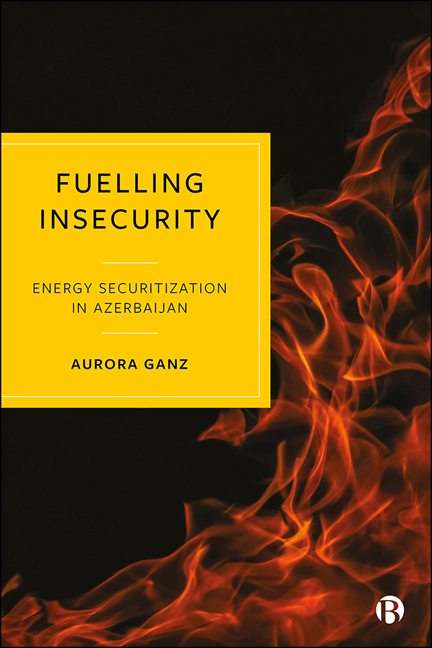Book contents
- Frontmatter
- Dedication
- Contents
- 1 Introduction
- 2 An Analysis of Actually Existing Energy Securitizations
- 3 Energy Securitization in the Land of Fire
- 4 Everyday Practices of Energy Security in Azerbaijan
- 5 Beyond the National Borders: NATO and Energy Security in Azerbaijan
- 6 Energy Securitization and the Private Sector: The Case of BP
- 7 Energy (In)Securitization: Abusive Security Practices and Poor Energy Choices
- 8 Conclusion
- References
- Index
1 - Introduction
Published online by Cambridge University Press: 13 May 2022
- Frontmatter
- Dedication
- Contents
- 1 Introduction
- 2 An Analysis of Actually Existing Energy Securitizations
- 3 Energy Securitization in the Land of Fire
- 4 Everyday Practices of Energy Security in Azerbaijan
- 5 Beyond the National Borders: NATO and Energy Security in Azerbaijan
- 6 Energy Securitization and the Private Sector: The Case of BP
- 7 Energy (In)Securitization: Abusive Security Practices and Poor Energy Choices
- 8 Conclusion
- References
- Index
Summary
James Bond's convertible runs fast through a giant oilfield in remote Azerbaijan. Miles of drilling bits and pumps penetrate the arid and dusty ground to extract the oil. An English visionary magnate is building a pipeline to transport Azerbaijan's oil to Europe, but the Russians threaten to bomb the corridor and Bond needs to stop them. That is what the British spy is after: energy security. It was 1999 when the film The World Is Not Enough was released; the Baku–Tbilisi–Ceyhan (BTC) pipeline was only a project but a far-ighted one. Today, the BTC pipeline – together with the South Caucasus Pipeline – connects Azerbaijan's oil and gas reserves to Europe's energy-hungry market, making the 20th-century dream of connecting the west to the Caspian energy wealth a lucrative reality. Despite its questionable sensationalism and stereotyped geopolitics, the Bond film shows a common reality of the energy sector: the presence of security and military professionals in the oil and gas fields. This points to an overlap between energy and security and ties energy to practices of defence and enforcement. This book examines the large network of security professionals and the wide range of energy security practices that have spread in Azerbaijan's energy sector. I should stress that these practices share little with the extraordinary lustre of popular imaginaries: the military and security professionals called to secure energy in Azerbaijan are much more ordinary versions of James Bond. For instance, these agents are employed to patrol infrastructure, guard access to facilities and administrative buildings, work behind their desks to monitor security technology, conduct due diligence on workers, enforce land expropriation and participate in different forms of training and capacity building. While I recognize the ontological plasticity of security (Chapter 2), in this monograph I am primarily concerned with those security practices that imply the actual or potential use of force. Hence, this study does not primarily aim at exploring the infinite conceptual and policy possibilities behind energy security. Conversely, it is interested in exposing how the particular rendering of energy security as a conventional security threat expands military and enforcement, defence and policing, coercion and control, towards uncharted territories.
- Type
- Chapter
- Information
- Fuelling InsecurityEnergy Securitization in Azerbaijan, pp. 1 - 25Publisher: Bristol University PressPrint publication year: 2021

